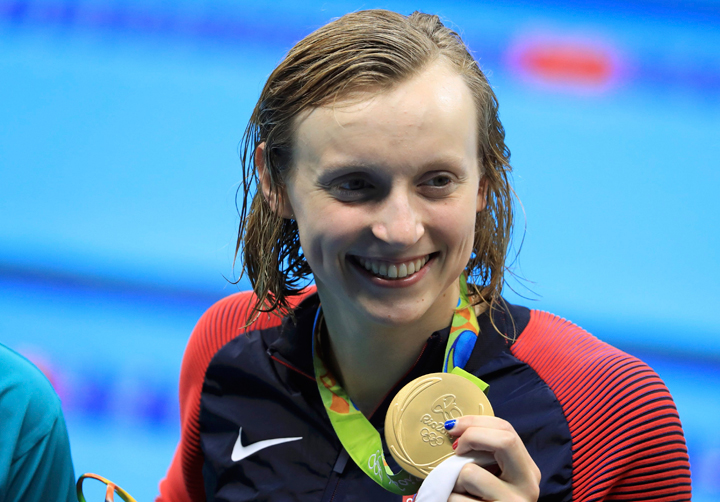Since the start of the 2016 Olympic Games in Rio, women have dominated the podium. In fact, at time of publishing, all of Canada’s medals had been won by female athletes.

But that hasn’t prevented widespread complaints of sexist media coverage concerning all athletes. Here are some examples:
Swimmer’s husband credited for her success
When Hungarian swimmer Katinka Hosszu set a new world record in the 400-meter individual medley on Saturday, NBC commenter Dan Hicks said, “There’s the guy responsible for turning Katinka Hosszu, his wife, into a whole different swimmer,” when the camera panned to her husband in the stands.
While Shane Tusup, Hosszu’s husband, also serves as her coach, the remarks sparked outrage on Twitter.
Hicks later said he was alluding to the fact that Tusup is Hosszu’s coach.
“It is impossible to tell Katinka’s story accurately without giving appropriate credit to Shane, and that’s what I was trying to do,” Hicks said.
The story surrounding Hosszu and Tusup’s relationship has been big talk in the swimming world.
Hosszu failed to medal in the 2012 London Olympics. A year later she married Tusup and asked him to be her coach – the duo have been training hard ever since in hopes of making a comeback in Rio. However, as Deadspin pointed out, Tusup has faced allegations of abusing Hosszu.
Bronze medal winner described as “Wife”
On Sunday, the Chicago Tribune faced widespread scrutiny for publishing a story about U.S. trap shooter Corey Cogdell-Unrein (who happens to be married to a Chicago Bears football player) winning bronze with the following headline: “Wife of a Bears’ lineman wins bronze medal today in Rio Olympics.”
Many argued the headline was sexist because it identified Cogdell-Unrein as a wife, instead of an athlete.
The Tribune later apologized for the story, stating it was “focused too hard on trying to emphasize the local connection” in its initial tweet about Cogdell-Unrein, who happens to be a three-time Olympian.
“She swims like a man”
Also on Sunday, as U.S. swimmer Katie Ledecky beat her own world record in the women’s 400 metre freestyle, NBC commentator Rowdy Gaines said, “People think she swims like a man.”
Gaines was likely referencing comments made by 2012 Olympian Connor Jaeger, who told the Washington Post earlier this year that Ledecky’s stroke is “like a man’s stroke.”
“I mean that in a positive way. She swims like a man,” Jaeger said.
Still, the remark didn’t sit well with Twitter users.
Another NBC commentator followed the statement saying, “She doesn’t swim like a man, she swims like Katie Ledecky!”
Golden U.S. gymnasts “might as well be standing in a mall”
Another NBC commentator was accused of sexism after saying the U.S. women’s gymnastics team looked like that “might as well be standing in a mall” when they were caught on camera laughing in between competition.
According to the International Olympic Committee, more women are competing in Rio than any other year in Olympic history.
In Rio, 45 per cent of those competing are women. That’s double the amount of female Olympians who competed 40 years ago in 1976.
There has been some controversy surrounding the objectification of male athletes at the Rio Olympics – for example, this article titled “We Need To Talk About This Brazilian Gymnast Right Now,” which features shirtless photos of the male gymnast. There was also some controversy about the Internet’s sudden love for Tonga’s shirtless, oiled-up flag barer.
But, according to a new study from the Cambridge University Press, there are still wide discrepancies in how the media and fans talk about women in sports.
The study, which analyzed over 160 million words from newspapers, academic papers, tweets and blogs, found that language surrounding female athletes was disproportionately focused on appearance, clothing and relationship status – when we even focused on female athletes, that is. The study also found men are mentioned almost three time more often in sports discussions than women.
According to the study, the most common words used to describe women in sport included ‘aged,’ ‘older,’ ‘pregnant’ and ‘married’ or ‘un-married.’
However, the top words used for men in sport included ‘fastest,’ ‘strong,’ ‘big,’ ‘real’ and ‘great’.
“When it comes to performance, it seems as though men also have the competitive edge: we see men associated with verbs such as ‘mastermind,’ ‘beat,’ ‘win,’ ‘dominate’ and ‘battle,’ whereas women are associated with verbs such as ‘compete,’ ‘participate’ and ‘strive,’” read the study.
“The research also showed higher levels of infantilising or traditionalist language for women in sport, who are more likely to be referred to as ‘girls’ rather than ‘woman.’ The same can’t be said for men being called ‘boys’.”
Canadian athletes have faced their own sexism controversies, too.
In 2015, Canadian tennis star Eugenie Bouchard was asked to twirl for the crowd to show off her outfit at the Australian Open by a male interviewer. After winning a match at the same tournament in 2013, she was asked who her ideal date was (she answered “Justin Bieber,” but the question garnered a lot of controversy).





Comments